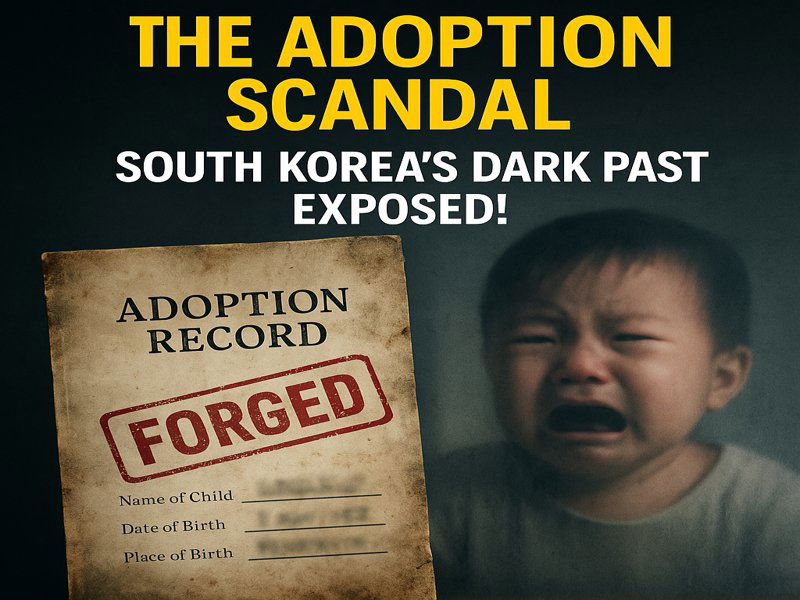South Korea’s Adoption Scandal: The Dark Truth EXPOSED!

Table of Contents
Introduction
The Start of a Multi-Million Dollar Industry
Investigative Findings: Lies, Corruption & Stolen Identities
The Devastating Impact on Adoptees
Why This Scandal Still Matters Today
What Needs to Change?
Conclusion: A Nation’s Reckoning
Join the Conversation! (Call to Action)
1. Introduction
Imagine discovering that your entire identity was a lie—your name, birth date, even your family history. For over 200,000 South Korean adoptees sent abroad, this nightmare is real.
Since the 1950s, South Korea has been the world's largest "exporter" of children for adoption, but recent investigations reveal a horrifying truth: many of these adoptions were fraudulent, driven by profit, and often carried out without parental consent.
Now, a South Korean government commission has blown the lid off this dark history, uncovering decades of systemic corruption, falsified records, and heartbreaking human rights violations.
2. The Start of a Multi-Million Dollar Industry
After the Korean War (1950–1953), the country was one of the poorest in the world.
Thousands of orphans, mixed-race children, and those from struggling families were put up for adoption.
The government, eager to rebuild, saw international adoptions as an opportunity to lessen welfare costs while bringing in foreign revenue.
Adoption agencies charged foreign families $3,000 to $4,000 per child, with profits soaring to $15–20 million annually.
What started as a humanitarian effort quickly became an unchecked, lucrative business.
3. Investigative Findings: Lies, Corruption & Stolen Identities
In 2022, the South Korean Truth and Reconciliation Commission launched an investigation, and their 2025 report exposed shocking facts:
✅ Falsified Documents: Birth records were altered to list children as orphans, even when they had living parents.
✅ Coerced Adoptions: Poor mothers were pressured or deceived into giving up their babies.
✅ Profit-Driven System: Private agencies operated without government oversight, prioritizing money over child welfare.
✅ No Paper Trail: Many adoptees received fake or incomplete records, making it nearly impossible to trace their biological families.
4. The Devastating Impact on Adoptees
For thousands of adoptees, the truth shattered their sense of self.
Out of 100 investigated cases, 56 adoptees were confirmed victims of this scandal.
Many adoptees sent to the US, Sweden, and Denmark discovered their adoptions were based on lies.
Some ended up in abusive or neglectful homes, with little to no post-adoption support.
One adoptee shared:
"I spent decades searching for my real family, only to find out my adoption papers were fake. My parents never gave me up—I was stolen."
5. Why This Scandal Still Matters Today
Although South Korea has tightened adoption laws and reduced international adoptions, the damage remains:
Thousands of adoptees still lack access to their real birth records.
Many biological families are searching for lost children, but with no government support.
The South Korean government has yet to issue an official apology.
The question remains: Will justice ever be served?
6. What Needs to Change?
To prevent future tragedies, activists are demanding:
✔️ A formal apology from the South Korean government.
✔️ Easier access to adoption records for adoptees seeking their families.
✔️ Stronger oversight of adoption agencies worldwide.
✔️ Reparations for those who suffered due to fraudulent adoptions.
South Korea, now a global tech leader, must confront this dark chapter in its past if it truly values justice and human rights.
7. Conclusion: A Nation’s Reckoning
South Korea’s international adoption program was once seen as an act of charity. Now, it stands as one of the world’s largest adoption scandals.
Will the government take accountability and help reconnect families? Or will thousands of adoptees remain lost in a system that failed them?
Time will tell. But one thing is clear: the world is watching.
8. Join the Conversation! (Call to Action)
What do YOU think? Should South Korea issue a formal apology?
- Innovate(5)
- Bharat(13)
- Life Hacks(1)
- Global(15)
- Reviews(1)



